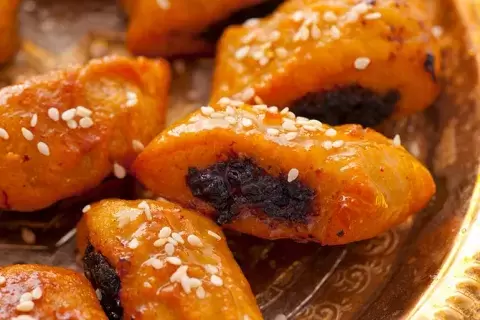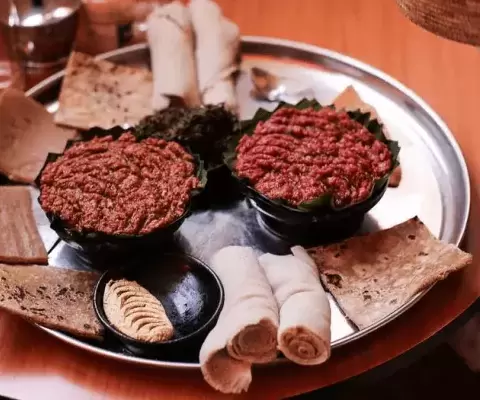Makroudh is a traditional North African pastry that holds a special place in the culinary heritage of countries like Tunisia, Algeria, and Morocco. It is a sweet delicacy that showcases the rich flavors and textures of the region. Makroudh is often enjoyed during festive occasions, religious celebrations, and family gatherings.
Introduction
Embark on a culinary adventure as we explore the rich and vibrant flavors of North Africa.
Today, we'll dive into the world of Makroudh, a traditional sweet treat that has captured the hearts of many. With its delectable combination of semolina, dates, and aromatic spices, Makroudh offers a unique experience for your taste buds.
Join us as we unravel the recipe, preparation techniques, cultural significance, and the best way to savor this delightful North African delicacy.
Recipe
Ingredients
- 2 cups fine semolina
- 1/2 cup melted unsalted butter
- 1/4 teaspoon salt
- 1/4 teaspoon ground cinnamon
- 1/4 teaspoon ground cloves
- 1/4 teaspoon ground nutmeg
- 1/4 teaspoon orange blossom water (optional)
- 1/2 cup water
- 1 cup pitted dates, finely chopped
- Vegetable oil, for frying
- Honey, for drizzling
Preparation
- In a large mixing bowl, combine the semolina, melted butter, salt, cinnamon, cloves, nutmeg, and orange blossom water (if using). Mix well until the semolina is evenly coated with the butter and spices.
- Gradually add water to the semolina mixture, a little at a time, while kneading with your hands. Continue kneading until the dough comes together and becomes smooth and pliable. If needed, add more water or semolina to adjust the consistency.
- Divide the dough into small portions and roll each portion into a thin log, about 1-inch in diameter. Make a small indentation along the center of each log using your thumb or the handle of a wooden spoon.
- Fill the indentation with finely chopped dates, gently pressing them into the dough. Seal the dough around the dates, ensuring they are completely enclosed.
- Preheat vegetable oil in a deep-fryer or a deep saucepan to 350°F (175°C). Carefully add the Makroudh to the hot oil, a few at a time, and fry until golden brown and crispy. Remove with a slotted spoon and place on a paper towel-lined plate to absorb any excess oil.
- Once cooled, drizzle honey generously over the Makroudh, allowing it to soak into the pastry.
Special Equipment
- Deep-fryer or deep saucepan
- Mixing bowl
- Slotted spoon
- Paper towels
Serving Suggestions
Makroudh is traditionally served with a warm cup of mint tea, a staple in North African cuisine. The combination of the sweet, flaky pastry and the refreshing herbal tea is simply irresistible.
Alternatively, you can enjoy Makroudh as a dessert alongside some fresh fruits or a dollop of whipped cream. Feel free to explore and experiment with different accompaniments to suit your taste.
Nutritional Value
Makroudh is a sweet treat, and while it's delicious, it's important to enjoy it in moderation. The exact nutritional values may vary depending on the size and ingredients used, but typically, Makroudh is relatively high in calories due to its semolina and butter content.
It also provides a good amount of carbohydrates, healthy fats, and a touch of fiber from the dates. Remember to savor it as an occasional indulgence and complement it with a balanced diet.
Cultural and Traditional Value
Makroudh holds significant cultural and traditional value in North African countries, especially in Tunisia and Algeria. It is often prepared for special occasions, festive celebrations, and religious holidays such as Ramadan.
The intricate preparation process and the use of staple ingredients like semolina and dates reflect the region's culinary heritage. Sharing Makroudh with family and friends reinforces the bonds of community and serves as a way to honor cultural traditions.
Conclusion
Travel to the enchanting world of North African cuisine by preparing Makroudh, a delectable sweet treat that combines semolina, dates, and aromatic spices. With its rich cultural significance and tantalizing flavors, Makroudh is an experience worth savoring.
So, gather your ingredients, immerse yourself in the enchanting aromas, and embark on a culinary journey that will transport you to the heart of North Africa.
Bon appétit!














